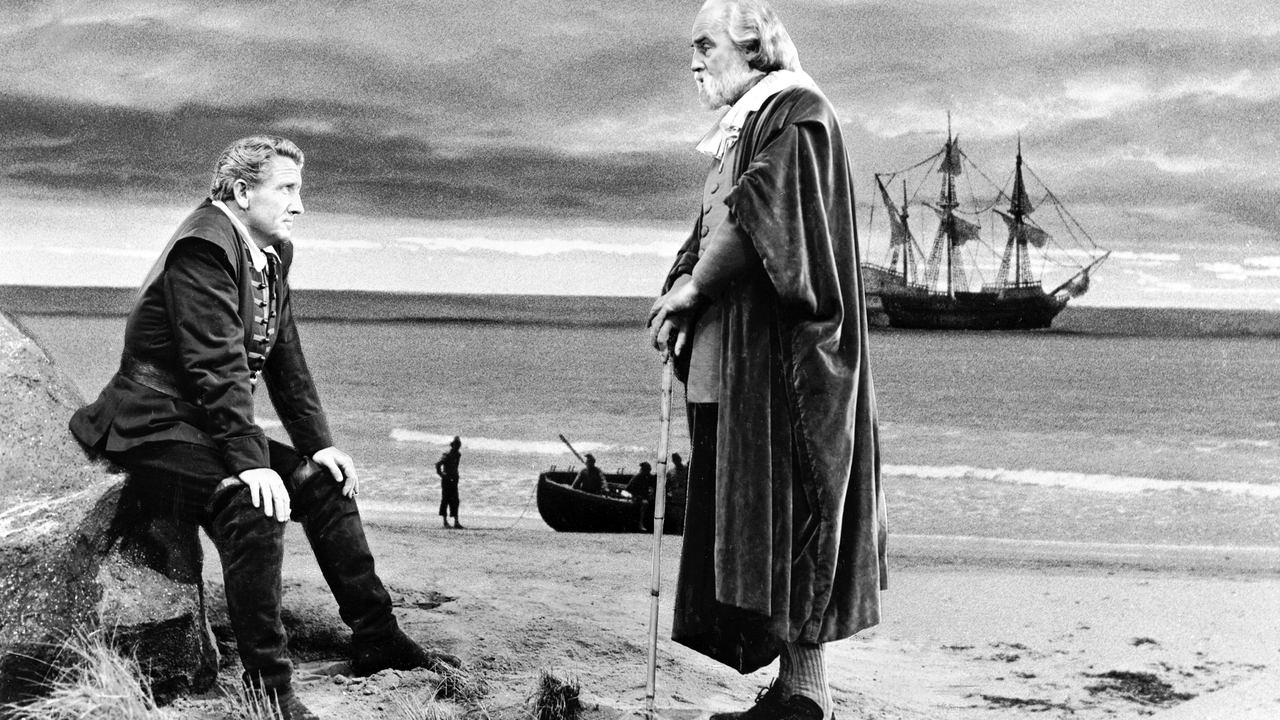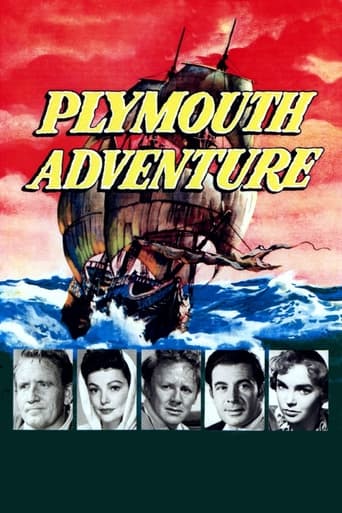

I had never heard of this flick and tuned to it (thank you, Turner Classic Movies) primarily because of the presence of the great Spencer Tracy and one of my favorite character actors, Van Johnson, whose acting skills I find vastly underrated. I was not disappointed, and I was surprised to read the many disparaging comments here. I cannot speak for historical accuracy but I found the story gripping and the script very well written. Tracy reminds us again of the reason he is regarded as one the greatest actors of his generation. No doubt that the love interest between him and Bradford's wife is probably apocryphal, and was inserted to fulfill Hollywood's requirement for a romantic angle, but so what? Leaving that aside the movie is a pretty engrossing depiction of the trials and travails of the Pilgrims, although the conditions on their actual voyage were probably a lot grimmer than Hollywood could politely depict in those days. All in all a very worthwhile effort and well worth seeing.
... View MoreThis is a very fine movie! As I am not American these pilgrims have not meant so much to me - although I recognized a name or two - but now I feel I know them and understand them a little. Not only because of what I learned in the movie itself, but from the reading I have done after wards because it awakened my interest and curiosity. Good historical movies shall work just like that - and for a good cause a little poetical license is acceptable! Because without the unconsummated and tragic love story, also if it did not happen in reality, this movie would not have been half as thrilling.Some reviewers here have complained that Spencer Tracy looks too old to play Captain Jones, but I find this strange as the real Captain Jones was the same age as Tracy... and as Jones also partook of the hardships on board, not only on this famous voyage but in a whole life at sea, and in fact died only a year after he returned to England, HE probably did not look like a spring chicken either... I also must admit that I at least find Tracy attractive in this part!The best thing about this movie is the dialogue; there are many lines that are as beautiful as poetry. Captain Jones' words when he talks of his broken ship, his lonely nights and his feverish longing for Mrs Bradford, is some of the best dialogue I have ever heard in a love scene written for a movie. Very pungent and erotic with a feeling of impending doom...The feeling of being transported to the time period is very good. The sailing part is as far as I can see accurate - you get to see a little of the sailors really working the sails, pulling up the anchor etc. (I would have wanted more of this). The photo is beautiful and there are impressive storm scenes etc..There is one thing lacking though: I would have expected more religious ardor from the passengers. More spirit. After all: these are the founding fathers!!! I think they come out as too ordinary, too preoccupied with practical matters like any migrating peasants.
... View MoreKids, I was compelled to check the "spoilers" box because you -- lacking in curiosity as you are -- might not know that the "Mayflower" was the ship on which the Pilgrims sailed to Boston in 1620. (That is, 1620 AD.) Henry Cabot Lodge was one of the passengers. (Well, he might as well have been.) The reason the Pilgrims were moving from Plymouth to Plymouth Rock was that they'd been subject to religious persecution in England. They didn't feel that the Church of England had moved far enough away from the sybaritic splendor of the highly ritualized Roman Catholic Church. It's a little complicated, but that's the general idea.Well, it was a perilous trip across the North Atlantic in 1620. They used sailing ships in those days, and they were almighty slow, so people ran out of food and water and stuff like that. Not like the today's QE2, where I left the hair salon with a pompadour that made me look like Donald Trump -- proud and unashamed. I'm not sure the British cuisine on the QE2 was that much of an improvement over the Mayflower's, but so be it. Boy, the Mayflower passengers were lucky to make it at all. But they did, and they gave us the American Revolution, the Constitution, baked beans, four presidents, and ultimately this movie.This is an MGM product so you get solid-as-a-rock family entertainment with magnificent production values. The special effects are fine. There is an exciting storm at sea that threatens to destroy the Mayflower. (Every story of a ship at sea must include a scene of a storm.) All the studio's talent is deployed, including a stellar cast. Spencer Tracy is Captain Jones, skipper of the Mayflower. Gene Tierney is the pouty-lipped married passenger whom he loves but whom he treats as an ordinary doxy. In supporting roles are rough sailor Lloyd Bridges, solemn preacher Leo Genn, civilian carpenter Van Johnson, sturdy diarist and narrator John Dehner, and reliable stalwarts like John Dierkes.There are two problems with the movie, and they're both pretty big.The casting decisions are inexplicable. Spencer Tracy as a consistently contemptuous, cynical, money-grubbing, underhanded Captain Queeg with glands? Hardly. Spencer Tracy is a man who carries moral authority along with his common sense Americanism. He's the firm, authoritative, slyly wisecracking, but empathic boss you wish you had.And Van Johnson as an unemployed carpenter saying lines like, "I had hoped to find me a berth for the night, sir"? Not a bit of it. Van Johnson is the optimistic, rosy-cheeked guy next door. He's polite, cheerful, and in love with Phyllis Thaxter. In any case, he's a lead, not a supporting player.That's the casting problem. Then there's the problem of the plot. How do you fill up an hour or more of a ship at sea full of relatively dull people? I mean, they're not pirates or mutineers. So you invent an intrigue between the gruff Tracy and the winsome Tierney that struck me as completely lacking in credibility. Tracy is not a romantic lead. He's short and rather dumpy and, though handsome in a manly way, looks nothing like Cary Grant. Tierney suffers because she is torn between her love for the adamantine Tracy and the pious Genn. She finally offs herself. Actually, she didn't. Two people died during the voyage, both of illness.I will bet, though, that there was genuine drama aboard the Mayflower. Here's why. There were about 130 people aboard, including both passengers and crew, and the ship itself was about 100 feet long. There was also every bit of cargo that a new community would need in a demanding new environment. One hundred feet is peanuts. The "tween decks", where many slept, was a space probably about four feet high. The people must have been piled on top of one another but you'd never know it. Space and violations of space are not very dramatic. We watch scenes of Van Johnson showing Dawn Addams where he goes when he wants to get away from things and be alone. It's the ship's rope locker, and it's about the size of the Garden Court Restaurant in San Francisco's Sheraton Palace Hotel. Kids, Googling will lead to goggling. You should have LUNCH there if possible. Try the cottage cheese. Tell them I sent you.Anyhow there's no gainsaying that MGM was the biggest most powerful studio in Hollywood at the time this was released, but that doesn't mean that somebody didn't make a couple of big mistakes.
... View MoreOther reviewers talk like Plymouth Adventure is fiction. They think Clarence Brown is like James Cameron, who cares more about the story conforming to a movie than the other way around. In other words, they have no idea what integrity is.Though much was documented - and is adhered to by the plot points - much is conjecture, and this can be subject to dramatic license. Of course, the dialog is up to the screenwriter and director. We can discuss this, but for me, the language and dialog weren't at all problematic, nor was the lush cinematography, in itself (see below).I have only two quibbles:I should have preferred to see Plymouth Adventure in black and white. The Pilgirms were a black and white lot who established a black and white society.I don't mind myth-making, because I think myths can be metaphors for the truths behind them. Of course, myths can be used in malign ways, as we know from the Nazis. Though not malign, the myth of the Pilgrims is of questionable value, since we know that the Pilgrims were seeking, in the New World, freedom, but freedom to establish their own tyranny. This is different from the myth, say, of George Washington and the cherry tree, since Washington was a true archetype of integrity. Nevertheless, rather than making a debunking movie showing the Pilgrims as a kind of proto-Taliban, perhaps it would be better to let their qualities of courage and resourcefulness stand, and leave the myth to benign neglect.
... View More